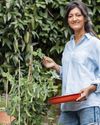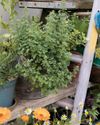
Campaigners say the battle to remove peat from compost isn't over yet, despite the Government confirming it will be illegal to sell bagged compost that contains peat after 2024.
While the Government has declared a ban on peat for amateur gardeners, it dropped a proposed deadline of 2028 to remove peat from professional horticulture, meaning growers can still produce plants in peat-based compost. A ban at some point is still on the table, and the Government says it "continues to work closely with the horticulture industry" to help them make the switch.
Nursery growers get through over a million cubic metres of compost a year - and over half (51.7 per cent) 66 Growers million cuba compost a ye just over ha is peat. Fewer than one in 10 of the UK's 1,800 garden centres and nurseries have taken the plunge and gone peat-free, but that doesn't mean they aren't trying, says Horticultural Trades Association president James Barnes.
He says, though growers are making progress towards becoming peat-free, a shortage of substitutes such as wood fibre and composted bark is delaying the process: "The fundamental issue is that there just won't be enough peatfree compost to supply the nation." Like many growers, Suffolk-based Mr Fothergill's is trialling peat-free composts before taking the plunge. This year it grew tomatoes and petunias in both peat-free and peat-based compost. Technical manager David Fryer says those grown peat-free needed more feeding, but it hasn't put him off.
"We know peat isn't sustainable," he says.
"We expect to be peatfree within two years." use over a metres of ar, of which is peat 99 Dr Anton Rosenfeld of Garden Organic says it's too little, too late: "It's like doing your homework on the bus." He says gardeners can avoid buying plants grown in peat-based compost by raising them from seedlings and cuttings at home instead, and looking out for peat-free nurseries.
This story is from the November 2022 edition of Gardeners World.
Start your 7-day Magzter GOLD free trial to access thousands of curated premium stories, and 9,000+ magazines and newspapers.
Already a subscriber ? Sign In
This story is from the November 2022 edition of Gardeners World.
Start your 7-day Magzter GOLD free trial to access thousands of curated premium stories, and 9,000+ magazines and newspapers.
Already a subscriber? Sign In

A new plot for tasty crops
Taking on a new allotment needn't be hard work. By simply following a few easy tips you can have bumper crops in no time, just like Alessandro Vitale

We love July
July is an island floating between the joy of June and the slightly fatigued month of August. It's a grown-up month: the year has shrugged off its adolescent exuberances, the weather is (hopefully) warm enough for ice cream to be one of your five a day, the sea should be swimmable without (too much) danger of hypothermia and thoughts will be of holiday shenanigans and family barbecues. School's out this month, the next tranche of glorious summer colour is washing across our borders and it's my birthday. Lots of reasons to give three rousing cheers for July!

YOUR PRUNING MONTH
Now, at the height of summer, Frances Tophill shows how to boost your plants' health and productivity with a timely cut

Hassle-free harvests
Flowers are out in abundance this month and for Jack Wallington, many of these blooms make delicious, low-effort pickings

Bite-sized bounties
Glorious doorstep harvests can easily turn into gluts, so let Rukmini Iyer's recipes help you savour every last bit

Upcycled outdoor living
Create unique and stylish garden features for minimal cost using reclaimed materials and simple DIY skills. Helen Riches shares four step-by-step projects and more inspiring eco tips

Secrets of a COLOURFUL GARDEN
Buildings and landscapes can play a vital role in supercharging your space, as Nick Bailey demonstrates

Greening up a city balcony
Looking for sustainable, small-space gardening ideas? Take inspiration from Oliver Hymans' transformed balcony garden in north-east London - now a lush, green haven for humans and wildlife

The dry and mighty garden
As we adapt our gardens to a more volatile climate, Alan Titchmarsh reveals how to create a drought-tolerant plot and picks his top plant performers

Nature knows best
Carol Klein explains how to choose plants for specific growing conditions, based on what has naturally adapted to thrive there